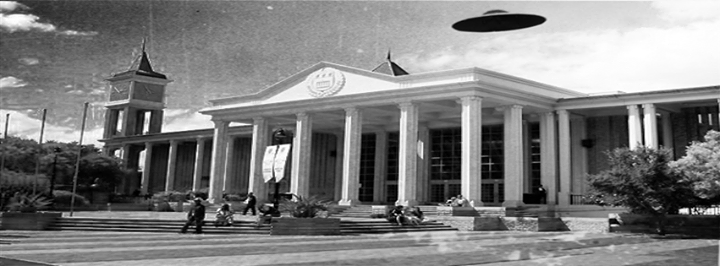Aliens on Campus: an Alternate Reality APPROACH TO STUDENT INCLUSION
Friday, March 18, 2016
Wouter Grove (University of the Western Cape, South Africa), Johan Breytenbach, Leona Craffert
This case study describes the development of a “Confucius says…”- meme-inspired, technology-enhanced Alternate Reality Game (ARG) program for student induction purposes at a higher education institution in South Africa. Concerns that received attention during this study include, inter alia, sensitivity to the current higher education landscape and digital literacy inequalities in South Africa when designing student digital inclusion processes, the role of meaningful inefficiency in gaming in developing civic literacy within a developing world context, benefits and challenges related to using ARG as a communication approach towards diverse groups of students, and the (controversial) concept of memes as remixed communication devices that can be used to benefit student engagement and digital inclusion.
Concerns that received attention during this study include, inter alia, sensitivity to the current higher education landscape and digital literacy inequalities in South Africa
Context
In the global knowledge economy of the 21st century, universities are tasked with graduating digitally literate, connected students. Rushkoff (1997) describes tertiary students as needing to be “equipped to absorb the data flying across our screens, make sense of the post-linear grammar with which it is formatted, and participate in its production as amateur journalists.” Higher education (HE) institutions should, by implication, be digitally inclusive.
South Africa’s struggle in the digital inclusion arena is undeniably linked to inequalities of access to digital literacy education resulting from years of societal division under Apartheid (Balfour & Kajee 2011). This unequal reality is particularly problematic within HE, where digital technologies are increasingly becoming a feature (Balfour & Kajee 2011).
Within this context, an Alternate Reality Game (ARG)-based student induction program was designed at the University of the Western Cape to enhance student engagement and digital inclusion (“UWC Homepage” 2014). ARG presented itself as a potential solution, as it could include all students regardless of the student’s digital capacity in what Suits (1977) refer to as the“temporary reallocation to autotelic activities of resources primarily committed to instrumental purposes.”
Purpose
The purpose of this project was to increase student engagement using ARG and localized memes, while increasing higher education institutions’ level of digital inclusion. ARG has been used in HE to increase student engagement (Piatt 2009; Whitton 2009a). Literature also provides examples where memes were used as engagement devices (Börzsei 2013). Numerous university meme pages exist on social media sites such as Facebook (Börzsei 2013).
Memes, as “units of cultural transmission,” were first conceptualized by Dawkins (2006). Davison (2012) defines an internet meme as follows: “An Internet meme is a piece of culture, typically a joke, which gains influence through online transmission.”
The common usage of a “meme” was criticized by Jenkins et al. (2013), who questions the concept of deterministic “self-replicating” culture and the negating of the agency role of greater public control over content that spreads through culture (Jenkins 2014). This study asks the question whether deliberate meme creation may offer value in HE.

The Game [Design and approach]


A multi-channel communication strategy was designed with our target group’s diversity in mind and utilized text messaging, Unstructured Supplementary Service Data (USSD), mass e-mail, as well as social media channels (Facebook; Twitter; Google Plus and YouTube).
A multi-channel communication strategy was designed with our target group’s diversity in mind and utilized text messaging, Unstructured Supplementary Service Data (USSD), mass e-mail, as well as social media channels (Facebook; Twitter; Google Plus and YouTube).
Storyline: Confucius is the leader of the alien craft from planet ConfusX-12 that crash-landed at UWC. Remixed videos and images were teased onto a website and social media channels (“UWC Sightings Homepage” 2014). The League of Deconfusers is a secret society receiving telepathic messages from Confucius via social media, and they are actively recruiting UWC students to join the League. Senior students were recruited as Deconfusers, issued with branded t-shirts and given short training.
Confucius’ nemesis is the “Doom of Not Knowing” (The DONK) and attacks people not connected and linked. The DONK was spotted at various places on campus and captured onto remixed videos which were placed onto the various web properties created for the campaign.
Players moved through the game by collecting clues, answering questions, uploading media (video; images; text), entering codes left at particular places at particular times and using particular social media hashtags. The campaign aimed to create opportunities for ideas to evolve through deliberative dialogue, thus creating meaningful inefficiencies (Gordon 2012).
Findings
Lessons learnt from this pilot case include (i) ARG showed potential as a communication tool in a context characterized by varying levels of digital literacy, (ii) leveraging [by means of remixing/repurposing] internet memes within ARGs in order to attract student attention within the attention-deficit economy, showed sufficient promise to continue investigating its utilization, (iii) social media was confirmed as popular communication tool (within ARG) for marketing and communication amongst students, (iv) the use of existing online memes as engagement catalysts had a positive impact on student engagement within the ARG-enriched induction program, and (v) time constraints (only 5 days of gameplay) impacted negatively on the project team’s capacity to create sufficient scaffolding to ensure ease of mastery and more efficient adoption of the game by the target group.
The true ARG aesthetic may not be optimal within educational applications. As Whitton (2009b) states: “In order to generate larger player numbers, ARGs need either a) ensure a larger initial sign- up from the target population or b) ensure a greater percentage of active players from those who do sign up. Ways in which to achieve both of these outcomes deserves further consideration and research.”
Practical implications
Even within the very limited game play time, players and some other university stakeholders started remixing the memes utilized and even started creating and sharing their own memes. This corresponds with the experience of McGonical in other more well-known ARGs played out over much longer periods (McGonigal 2006).
On the potential value of the remixing culture in developing cultural literacy Jenkins (2006) states,“More and more literacy experts are recognizing that enacting, reciting, and appropriating elements from preexisting stories is a valuable and organic part of the process by which children develop cultural literacy.”
The potential exists that the creation of meme-based ARG induction games can leverage the generativity of internet memes that “allows instant reaction and encourages virality, so people can comment on the most current issues, events and people, as well as find an audience” (Börzsei 2013).
This is one of the ways in which the game did not succeed. There was a lack of sufficient opportunity to ensure that the many systems designed were truly responsive to player interactions as suggested by McGonigal (2006). Therefore it can be concluded that, although a meme-inspired ARG offers potential for enhancing student induction, it needs to play out over significantly longer time in order to derive maximum benefit, and it needs to be an integral part of the broader induction programs.
ACKNOWLEDGEMENTS
Our sincere appreciation goes to the following students who co-created Aliens on Campus: Reuben Claasen, Chiunde Mwanza, Conal da Costa, Ziyaad Parker and Vuyiswa Nomlala.
REFERENCES
Balfour, Robert John, and Leila Kajee. 2011. “Students’ Access to Digital Literacy at a South African University: Privilege and Marginalisation.” Southern African Linguistics and Applied Language Studies 29 (2): 187–196.
Börzsei, Linda K. 2013. “Makes a Meme Instead : A Concise History of Internet Memes.” SelectedWorks 7 (March): 1–29.
Dawkins, Richard. 2006. The Selfish Gene. 30th anniv. Oxford, UK: Oxford University Press.
Gordon, Eric. 2012. “Meaningful Inefficiencies in the ‘Smart City.’” Places of Social Media Available at: http://placeofsocialmedia.com/blog/2012/07/24/meaningful-inefficiencies-inthe-smart-city/.
Jenkins, Henry. 2014. “A Meme Is a Terrible Thing to Waste: An Interview with Limor Shifman (Part One). Available at: http://henryjenkins.org/2014/02/a-meme-is-a-terrible-thing-towaste-an-interview-with-limor-shifman-part-one.html.
Jenkins, Henry, Sam Ford, and Joshua Green. 2013. Spreadable Media: Creating Value and Meaning in a Networked Culture. New York: NYU Press.
Mcgonigal, Jane Evelyn. 2006. “This Might Be a Game: Ubiquitous Play and Performance at the Turn of the Twenty-First Century.” University of California, PhD thesis. Available at: http://janemcgonigal.files.wordpress.com/2010/12/mcgonigal_this_might_be_a_game_sm-1.pdf.
Patrick Davison. 2012. “The Language of Internet Memes.” In Social Media Reader, edited by Michael Mandiberg, 120–137. New York and London: New York University Press.
Piatt, Katie. 2009. “Using Alternate Reality Games to Support First Year Induction with ELGG.” Campus-Wide Information Systems 26 (4): 313–322.
Rushkoff, Douglas. 1997. Children of Chaos : Surviving the End of the World As We Know It. London: Flamingo.
Suits, Bernhard. 1977. “Words on Play.” Journal of the Philosophy of Sport (IV): 117–131. 7
Whitton, Nicola. 2009a. “Alternate Reality Games for Orientation, Socialization and Induction (ARGOSI)- Final Report”. Manchester, UK. Available at:http://argosi.playthinklearn.net/final.pdf.———. 2009b. “ARGOSI Evaluation Report”. Manchester, UK. Available at: http://argosi.playthinklearn.net/evaluation.pdf%0A.
If you like what you just read, please click the green ‘Recommend’ button below to spread the word! More case studies and calls for submissions are on the Civic Media Project. To learn more about civic media, check out the book Civic Media: Technology, Design, Practice.